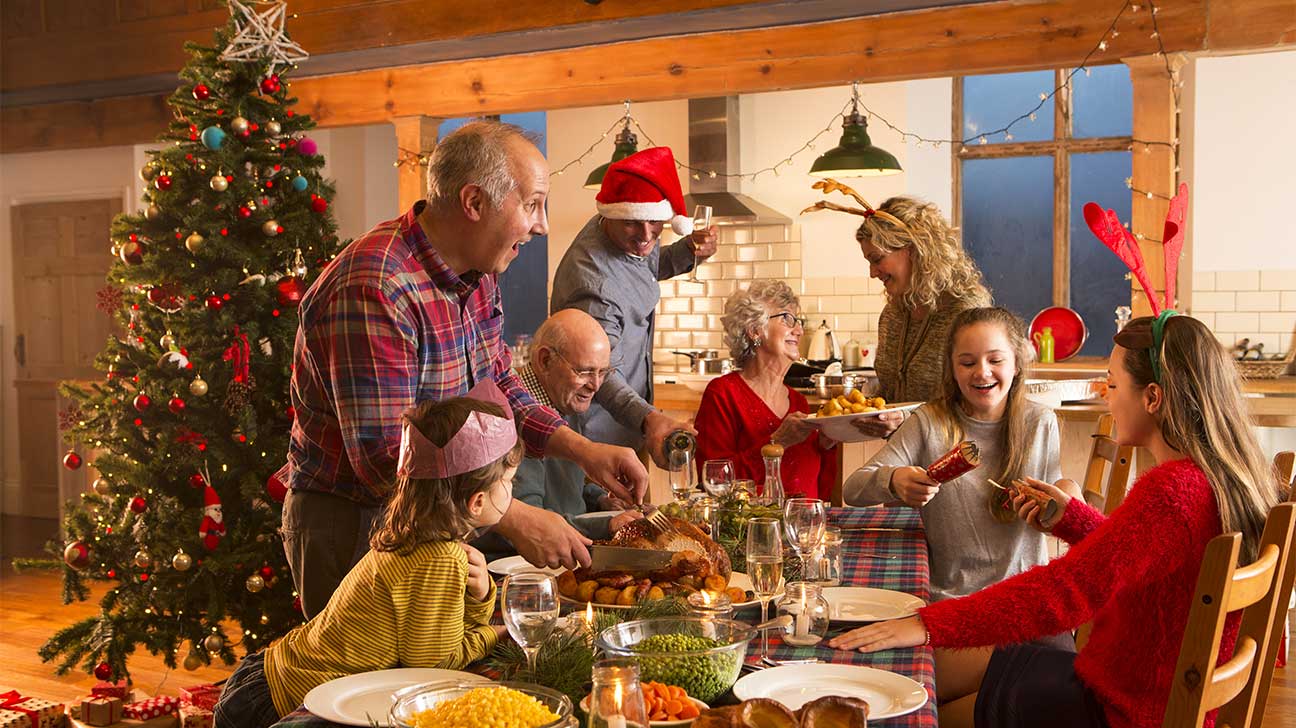
Christmas can be an isolating and depressing time for a person recovering from addiction without the support of their family.
They may be struggling to cope with issues of the past, find new ways to celebrate Christmas that don’t involve substances, or be dealing with mental health problems.
If you have a family member who’s recovering from alcohol or drug addiction this Christmas, it’s more important than ever to provide physical and emotional support.
Family And The Recovery Process
There’s a reason why family counseling and other services involving family members are often included in addiction treatment programs: family influence matters.
Whatever your family looks like, if you have a family member who’s recovering from substance use disorder, the support they get from you and other family members is vital to their recovery.
Research published in 2006 found that family-based treatment programs can have the following effects on family units:
- family involvement increases a recovering person’s motivation for recovery
- families understand the importance of recovery and express stronger support for their recovery
- families change patterns that have worked against recovery
- family members are better prepared for what to expect from recovery and relapse warning signs
- families learn what their strengths are, and how to take advantage of those strengths to support their loved one’s recovery
The study found that a person in recovery experiences the following benefits as a result of their family’s involvement:
- they’re encouraged to enter treatment or continue their recovery post-treatment
- they’re more motivated to remain in treatment
- there are fewer relapses
- they enjoy a supportive and healthy environment for recovery
Not only can your loved one in recovery benefit from having family support, but being involved in the recovery process can also heal individual members and the family as a whole.
Researchers have also found that family involvement in recovery helps other family members to:
- identify early signs of mental health disorders in themselves
- identify their own substance use issues or the early onset of these issues
- heal dysfunctional patterns of communication, behavior, and emotional expression
Issues Your Recovering Loved One May Face During Christmas
Depending on whether your loved one is currently in a recovery program, has just completed one, or is just starting a personal journey to recovery, their skill set for recovery and coping mechanisms will vary.
Someone who’s been through a drug treatment program and is working on recovery with counseling and peer support may be better prepared to handle the stressors of Christmas.
Here are a few of the issues your loved one might be facing this Christmas season:
- triggers: Triggers are internal or external factors that can lead to relapse, and can include emotional distress, family tensions, trauma, anxiety, and other issues around Christmas.
- being in withdrawal: Withdrawal can be uncomfortable, often causing nausea, vomiting, shaking, and other symptoms. These symptoms can often lead to cravings and relapse.
- fear of failure: Your family member may worry about failing to meet the expectations of others, whether that includes remaining sober or being fully emotionally present.
- pressure to perform: Christmas can be a performative holiday (gift-giving, lots of socialization, etc.), which can add a lot of pressure to the day for someone in recovery.
- pre-existing issues: Mental health issues and underlying problems associated with drug use do not disappear just because it’s Christmas, which can be tough to handle alone.
- family tensions: Your family can be a source of support, but it may also be a source of tension and unrest for someone in a delicate time of recovery and healing.
- feeling unwelcome: Your loved one may be feeling unwanted or left out at Christmas, especially around family members who have witnessed their substance use.
- witnessing substance use: It may be difficult for your family member to see others smoke, use drugs, or drink alcohol while they’re in recovery.
- feeling judged: You may want to watch your loved one closely to prevent them from relapsing, but this can put them under great stress and induce feelings of judgment.
- explanations: Some family members may inquire about your loved one’s recovery. This can make your loved one feel very uncomfortable if they’re not ready to discuss it.
How To Be Supportive Of Your Loved One In Addiction Recovery Over Christmas
If you’d like to support your loved one in recovery during the holiday season this year, you can do so by assessing their recovery needs, discussing triggers and potential issues, and more.
Be Prepared To Leave Early
It’s often best for those in addiction recovery to leave early from social gatherings to avoid being a part of heavy drinking or drug use as the party goes on.
It can be difficult to leave alone, so you and your other family members can commit to arriving and leaving early alongside your loved one.
This will be especially important if you notice that certain triggers have come up, unwanted guests arrive, or hard conversations have started.
Having an exit partner can help to make your loved one feel more comfortable with doing what’s best for their recovery and sobriety.
Remove The Pressure Of Gift-Giving
Gift-giving at Christmas time can be especially difficult for people recovering from substance abuse.
Many people have spent a significant amount of money on drug rehab programs, legal fees, medications for recovery, therapy sessions, and more.
Realistically, purchasing gifts can put a great financial burden on someone who’s invested in their recovery and needs to save their money for other pursuits.
Consider a cost-efficient gift exchange with your family this Christmas:
- have a white elephant gift exchange
- have each family member draw a name out of a hat, and purchase something only for that person (there are also virtual options that serve the same function)
- exchange homemade or handmade gifts
- set a limit on how much each person should spend on gifts
- have a secret Santa gift exchange
- do a book exchange, where your family members may purchase a book or bring one they already own for a free exchange
- exchange coffee mugs
- have a baked goods exchange, a low-cost option where each person brings one baked good to swap with others in the group
- have a dollar store gift exchange, where each person brings gifts purchased at a dollar store
Make Non-Alcoholic Drinks
At times, people recovering from addiction may feel like they’re missing out on some of the holiday festivities of enjoying cocktails or spiked punches.
Just because they’re choosing not to have alcohol doesn’t mean they must be limited to a club soda.
You can be supportive of your family member’s recovery during Christmas by creating special holiday drinks without the alcohol.
There are countless recipes for mocktails, sparkling drinks, and fun holiday beverages that can bring the same festive spirit of enjoying a drink without including alcohol.
Be Supportive Of Your Loved One Saying No
For some families, being supportive might mean being ok with their loved ones not showing up to family functions.
Family events might be stressful and painful for your loved one in addiction recovery, especially if they’ll be in close contact with family members who have been unsupportive of their recovery or been involved with a traumatic experience.
Respecting their desire to decline an invitation is an important component of supporting their recovery.
Though you may miss their presence, this is a good sign that your loved one is recognizing high-risk situations and responding proactively to them.
Get Involved With Their Recovery Program
If your loved one is in a recovery program, such as a relapse prevention program or an inpatient program, there are likely opportunities for family involvement facilitated by the rehab center.
You can typically find family services at:
- non-religious addiction treatment centers
- faith-based rehab programs
- 12-step-based programs
- free rehab centers across the U.S.
- Medicaid rehab centers
- outpatient and inpatient treatment programs
If your family member is currently attending a drug or alcohol addiction treatment program, ask them if they’d feel comfortable with you and/or other family members attending family programs.
This can help to strengthen your bond as you go through the Christmas season, working through issues and coming up with solutions as a family.
You might find family services such as:
- family support groups
- family therapy with your loved one
- family education about drug and alcohol abuse
- education about substance use warning signs, relapse signs, and other useful information regarding your loved one’s recovery
Resources For Family Members Of People In Addiction Recovery During Christmas
If you and your family members are looking for further guidance and support for how to help your loved one in recovery during Christmas, explore the resources below.
Resources For Starting New Traditions On Christmas
If you’re not sure where to get started when it comes to new traditions involving gift-giving and drinks, use some of the tips below:
- Allrecipes: Mocktail Recipes
- Bon Appétit: 25 Mocktail Recipes That Aren’t Just Juice
- Real Simple: 31 Creative Gift Exchange Ideas That Make the Holidays Even More Fun
- White Elephant Rules: Official White Elephant Gift Exchange Rules
Self-Help Groups
Here are a few self-help groups for family members of those in addiction recovery:
- Al-Anon Family Groups: Get support from other family members and loved ones of people recovering from substance abuse.
- Herren Project, Online Support Groups: Herren Project provides weekly online support group meetings for families and loved ones affected by drug or alcohol addiction.
- Learn to Cope: You can find peer support, educational materials, and resources for family members of people in addiction recovery.
Resources For Managing Physical And Mental Health During Christmas
Below are a few resources that discuss stress, mental health, COVID-19 implications, and other helpful tips for mental health management over the Christmas season:
- Forbes Health, Healthy Holidays Are Possible—The Key Is Finding Your Balance: Learn about holiday health risks and how to find a balance this year.
- Mayo Clinic, Stress, depression and the holidays: Tips for coping: Use these tips for yourself, or bring a few ideas to your family member in addiction recovery.
- Mental Health America (MHA), Preparing For The Holidays During COVID-19: This resource can help you and your loved one in recovery to prepare for Christmas.
Resources For Helping Family Members With Addiction
Learn how to help your family member in addiction recovery this Christmas, and how to find treatment:
- Partnership to End Addiction, Helping an Adult Family Member or Friend with a Drug or Alcohol Addiction: Find answers to questions you may have about addiction.
- Substance Abuse and Mental Health Services Administration (SAMHSA), Treatment Services Locator: Find a recovery program that includes family services.
- SAMHSA, Resources for Families Coping with Mental and Substance Use Disorders: Videos, guides, and materials to help you support a loved one in recovery.
- Social Work Today — Families and Addiction — Surviving the Season of Stress
https://www.socialworktoday.com/archive/111511p10.shtml - National Center for Biotechnology Information — Chapter 6. Family-Based Services
https://www.ncbi.nlm.nih.gov/books/NBK64085/ - National Institute of Drug Abuse (NIDA) — What Triggers a Relapse? “Cues” Give Clues
https://teens.drugabuse.gov/blog/post/what-triggers-relapse-cues-give-clues


